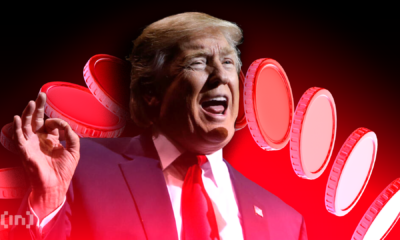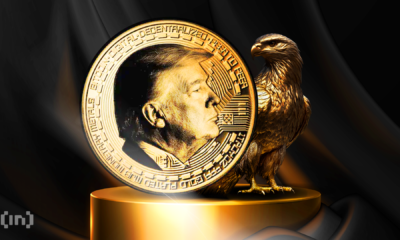Regulation
Donald Trump US Election Win Inspire Canada’s Crypto Leaders, Here’s How

Donald Trump’s victory in the US presidential election, along with a wave of pro-crypto candidates winning their races, has sparked interest among Canada’s cryptocurrency leaders. The crypto industry in the US invested heavily in these elections, spending $135 million to support candidates through initiatives like the Crypto’s Fairshake PAC and other super PACs.
Donald Trump’s US Election Win Spurs Crypto Advocacy Efforts in Canada
According to a Bloomberg report, Donald Trump’s presidential victory and the success of pro-crypto candidates in the US elections have led to increased interest among Canadian crypto advocates. The US crypto industry invested $135 million in supporting candidates through campaigns such as Crypto’s Fairshake PAC, backed by Coinbase, Ripple Labs, and Andreessen Horowitz.
In response, Canada’s crypto leaders are focusing on grassroots advocacy rather than campaign funding due to Canada’s strict donation limits. Stand With Crypto, a US-based advocacy group, expanded its efforts to Canada in mid-2023. The advocacy group is mobilizing local communities to engage with policymakers and raise awareness about digital assets.
As Canada’s interest in cryptocurrency advocacy grows, it recently marked a regulatory milestone with USDC issuer Circle. The stablecoin issuer became the first stablecoin provider to meet the new Value-Referenced Crypto Asset (VRCA) guidelines set by the Ontario Securities Commission (OSC) and the Canadian Securities Administrators (CSA). This approval ensures USDC’s continued availability on compliant Canadian platforms.
Focus on Policy Reforms and Stablecoin Regulation
Canada’s cryptocurrency industry has identified key areas for policy reform, including the regulation of stablecoins, retirement plan exposure to Bitcoin, and tax-free savings account options for crypto. Canadian Securities Administrators introduced stricter rules in late 2023, limiting the listing of stablecoins on crypto trading platforms.
These regulatory challenges have led to the exit of major platforms like Binance, Bybit, and OKX from the Canadian market. Industry leaders argue that stablecoins should be regulated as payment instruments rather than securities, aligning with global practices. This issue remains a central focus for Canadian crypto advocates.
Increased Transactions and Adoption Post-US Election
However, since Donald Trump’s election win, crypto prices and trading volumes have surged in both the US and Canada. WonderFi Technologies reported an increase in customer transactions, while Coinbase Canada noted higher user sign-ups. This growing interest reflects a rising awareness of the potential benefits of digital assets.
The chief executive officer of WonderFi Technologies Inc., Dean Skurka, commented,
“We’re hopeful, but it hasn’t quite played out that way in Canada historically, and obviously in the US this is the first time that it’s really become an election issue. Hopefully the positive response that it has seen the start of will be a signal to Canadian politicians to take it seriously.”
Lucas Matheson, CEO of Coinbase Canada, emphasized the importance of staying competitive in the global digital economy. He pointed to the Donald Trump administration’s pro-crypto appointments and increased adoption in the US as a call to action.
Matheson added,
“There are significant changes coming in how the US government and citizens in the US take advantage of the digital economy. It’s incredibly important that Canadians don’t miss out on this and sit on the sidelines and wait until the rest of the world has figured out how to take advantage of digital assets.”
With the next Canadian federal election approaching, Canada’s leaders aim to make digital assets a central political issue. The industry is advocating for open banking laws to include crypto and pushing for blockchain technology adoption.
Meanwhile, Donald Trump promise to make the US the crypto capital has faced challenges as 95% of Bitcoin is already mined, leaving limited scope for domestic production. Additionally, the reliance on Bitcoin mining equipment sourced from China complicates efforts to centralize operations within the US.
Disclaimer: The presented content may include the personal opinion of the author and is subject to market condition. Do your market research before investing in cryptocurrencies. The author or the publication does not hold any responsibility for your personal financial loss.













✓ Share: